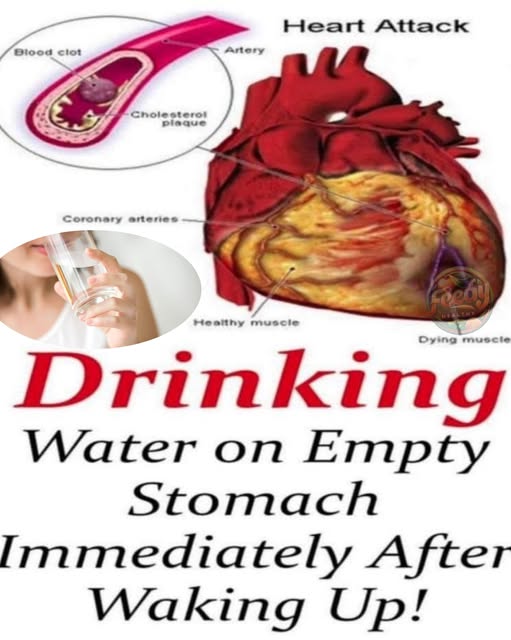Drinking water is often hailed as one of the simplest yet most powerful ways to support health. It’s no surprise, considering that around 60% of the human body is made up of water. It’s essential for nearly every function in our system—from transporting nutrients and oxygen to regulating body temperature, lubricating joints, and even cushioning vital organs. But lately, a popular trend has emerged suggesting that drinking water immediately upon waking in the morning has almost magical health benefits. Some call it a life hack for better skin, improved digestion, and higher energy levels. Others, however, dismiss it as just another health myth. So what’s the truth? Let’s break it down.
Why Our Bodies Need Water
Water is not just important—it’s fundamental to survival. Every single organ and tissue in your body depends on it. Your kidneys rely on water to flush out waste products, your brain needs it for optimal function, and your muscles depend on it to contract efficiently. Without enough water, you risk dehydration, which can cause fatigue, headaches, dry skin, dizziness, and even more serious health complications if prolonged. This is why staying hydrated throughout the day matters far more than obsessing over a single glass first thing in the morning.
Is There a Special Benefit to Morning Hydration?
One of the most common claims is that drinking water right after waking up rehydrates your body after a long night of rest. While this sounds logical, research suggests the body does not become significantly dehydrated overnight unless you went to bed already dehydrated. Urine color, often cited as a hydration indicator, is not a reliable measure of whether you need more water in the morning.
So does drinking water in the morning give you an advantage? Not necessarily because of the timing itself. The real benefit comes from simply making hydration a habit. If starting your day with water encourages you to drink more overall, then yes—it’s beneficial. But the idea that it has unique effects on brain power, skin glow, or metabolism just because it’s consumed in the morning is not strongly supported by science. What truly matters is consistent hydration throughout the entire day.
Water and Weight Loss: Timing or Lifestyle?
Another claim tied to drinking water in the morning—or before meals—is its supposed effect on weight loss. There is some truth here, but with nuance. Drinking water before eating can make you feel fuller, which might help you consume fewer calories. Research has also shown that drinking cold water can slightly boost metabolism through a process called water-induced thermogenesis, where the body uses energy to warm the liquid. However, these effects are modest and not tied specifically to morning consumption.
It’s also worth noting that drinking too much water right before meals might interfere with digestion for some people. The key takeaway is that while water can support weight management by reducing hunger and replacing high-calorie beverages, the timing of when you drink it is far less important than the overall amount you consume and the lifestyle you maintain.
Debunking Hydration Myths
Hydration is surrounded by myths, many of which sound convincing but don’t hold up under scrutiny. A few of the most common include:
- “Morning water flushes out toxins.” In reality, your kidneys and liver are already incredibly efficient at detoxifying your body. Drinking water supports this process, but there’s no special advantage to doing it only in the morning.
- “Water jump-starts your metabolism first thing.” While hydration is important for metabolic function, no evidence shows that drinking water at a specific time of day dramatically increases metabolism.
- “Better skin comes from morning hydration.” Clear, healthy skin comes from being consistently hydrated, not just from one glass in the morning.
Water is essential, but it isn’t a magic potion. Approaching hydration with realistic expectations helps avoid disappointment and misinformation.
What About Japanese Water Therapy?
A wellness trend known as Japanese Water Therapy has gained global popularity. Its advocates claim that drinking several glasses of room-temperature water immediately upon waking can help with a range of health problems, including constipation, high blood pressure, diabetes, and even cancer. The practice often includes strict rules about meal timing and avoiding cold water.
While the therapy encourages higher water intake—a good thing—scientific evidence does not support the idea that it cures serious illnesses like cancer or diabetes. What it may do is improve digestive health by promoting regular hydration and possibly aid weight loss by encouraging calorie restriction through strict eating windows. It can also help reduce constipation and headaches, which are often linked to mild dehydration.
That said, there are risks if the practice is taken to extremes. Drinking excessive amounts of water in a short period can cause water intoxication, a dangerous condition where sodium levels in the blood drop too low. Additionally, following overly rigid rules about meal timing can backfire, leading to rebound weight gain or disordered eating habits. As with most wellness fads, balance and moderation are key.
How Much Water Do You Really Need?
One of the most debated questions is how much water people should drink daily. The famous “8×8 rule”—eight 8-ounce glasses a day—is a decent guideline but not a one-size-fits-all solution. Hydration needs vary based on age, weight, activity level, climate, and health conditions.
For example, athletes, people living in hot climates, and pregnant or breastfeeding women may need significantly more water. Meanwhile, individuals with kidney problems or certain medical conditions may require medical guidance on fluid intake. A good rule of thumb is to drink when you’re thirsty and pay attention to your body’s signals. Foods rich in water—like fruits, vegetables, and soups—also contribute to hydration, so total water intake goes beyond just what’s in your glass.
The Bottom Line
So, is drinking water first thing in the morning beneficial? Yes, but not because of any mystical properties tied to timing. Starting your day with water is a healthy ritual because it helps establish good hydration habits, but the real focus should be on drinking enough water consistently throughout the day. The human body thrives when well hydrated, regardless of when the first glass is consumed.
If Japanese Water Therapy or other structured practices help you remember to drink more water, that’s fine—as long as you remain realistic about the limits of what water can and cannot do. It will not cure chronic diseases, but it will support overall well-being, energy levels, digestion, kidney health, and even mood.
In the end, water is not a miracle cure, but it is one of the most fundamental building blocks of health. Instead of obsessing over drinking it at a specific time, make it part of your daily rhythm. Listen to your body, drink when you’re thirsty, and remember that hydration is a marathon, not a sprint.




